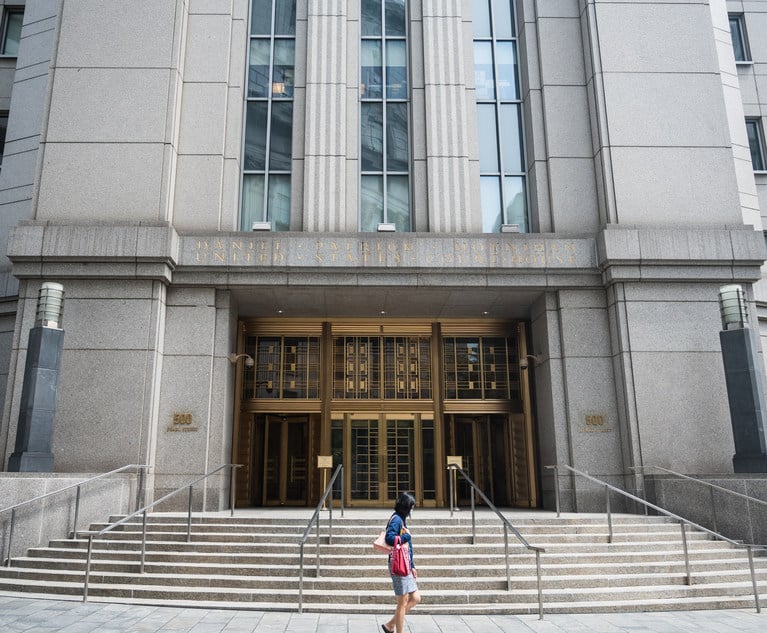Edward M. Spiro

December 16, 2024 | New York Law Journal
Diverging Standards to Invoke the EFAA in the Southern DistrictThe authors write "Enacted in 2022, the Ending Forced Arbitration of Sexual Assault and Sexual Harassment Act of 2021 (the “EFAA”), amended the Federal Arbitration Act (the “FAA”) so that in cases 'alleging conduct constituting a sexual harassment dispute or sexual assault dispute,' a claimant is not bound by an otherwise valid arbitration agreement. 9 U.S.C. §402(a). The EFAA is expansive in scope; it captures virtually every such case that could be filed in a court in the United States."
By Edward M. Spiro and Christopher B. Harwood
9 minute read

October 14, 2024 | New York Law Journal
Communications With Non-Retained Experts May Be Subject to Disclosure"Lehrburger explained that unlike retained experts, non-retained treating physicians 'wear a cloak of independence and lack of bias,'" write Edward M. Spiro and Christopher B. Harwood.
By Edward M. Spiro and Christopher B. Harwood
8 minute read

August 22, 2024 | New York Law Journal
Applying English Law to a Privilege Dispute Under Section 1782"Not surprisingly, privilege disputes constitute a frequent topic of litigation in connection with Section 1782 proceedings," write Edward M. Spiro and Christopher B. Harwood.
By Edward M. Spiro and Christopher B. Harwood
8 minute read

June 17, 2024 | New York Law Journal
Federal Issue Not Substantial Enough for RemovalWhere diversity jurisdiction is lacking, removal to federal court typically requires the removed case to assert a federal cause of action. An exception exists, however, where removal is proper if the state cause of action asserted involves a substantial federal issue.
By Edward M. Spiro and Christopher B. Harwood
8 minute read

April 15, 2024 | New York Law Journal
'Martindell' Presumption Does Not Extend to Protective Orders in ArbitrationsIn 'In re Grand Jury Subpoena Dated February 22, 2024, 2024', Judge Jesse Furman of the Southern District of New York confronted whether the Second Circuit's 'Martindell' test extends to protective orders issued by an arbitrator rather than by a district judge.
By Edward M. Spiro and Christopher B. Harwood
9 minute read

February 21, 2024 | New York Law Journal
When Communications Concerning a Client Can Be Withheld From the ClientConflicts arise between law firms and their clients that require lawyers within the firms to seek legal advice. In such situations, firm lawyers may seek advice from another lawyer within their firm about how to handle the issue. In subsequent litigation with the client, however, such communications may not be protected from discovery, particularly where the firm lawyer whose advice is sought has been involved in the representation of the client.
By Edward M. Spiro and Christopher B. Harwood
10 minute read

December 18, 2023 | New York Law Journal
The TVPA Does Not Preempt State Indemnification and Contribution ClaimsAlthough some courts have concluded that indemnification and contribution claims are available for claims arising under a federal statute only if the statute expressly or impliedly provides for them, other courts have addressed the issue by conducting a traditional preemption analysis. The Second Circuit has not addressed the issue, and district courts within the circuit have taken both approaches. District Judge Jed S. Rakoff of the Southern District of New York recently addressed this issue in the context of the Trafficking Victims Protection Act.
By Edward M. Spiro and Christopher B. Harwood
9 minute read

October 16, 2023 | New York Law Journal
Striking Improper Use of Settlement CommunicationThis article focuses on 'My Mavens v. Grubhub' and discusses how courts are unlikely to allow parties to base their allegations in a pleading on information they learned during settlement discussions, even if the information could later be obtained through discovery.
By Edward M. Spiro and Christopher B. Harwood
8 minute read

August 15, 2023 | New York Law Journal
Plaintiffs Should Be Prepared to Present Merits Evidence at the Class Certification StageTo prevail at the class certification stage, the named plaintiffs frequently must present evidence that goes to the merits of their claims in order to show that common issues predominate. That obligation is not new.
By Edward M. Spiro and Christopher B. Harwood
10 minute read

June 23, 2023 | New York Law Journal
Communications With Prospective Clients Carry Disqualification RisksAttorneys need to exercise some degree of caution in initial client consultations, or face the risk of a disqualification motion if the attorney is engaged on behalf of another party in a related matter.
By Edward M. Spiro and Christopher B. Harwood
9 minute read
Trending Stories
- 1Call for Nominations: Elite Trial Lawyers 2025
- 2Senate Judiciary Dems Release Report on Supreme Court Ethics
- 3Senate Confirms Last 2 of Biden's California Judicial Nominees
- 4Morrison & Foerster Doles Out Year-End and Special Bonuses, Raises Base Compensation for Associates
- 5Tom Girardi to Surrender to Federal Authorities on Jan. 7
More from ALM
- Scan In Progress: Litigators Leverage AI to Screen Prospective Jurors 1 minute read
- Legal Speak at General Counsel Conference East 2024: Match Group's Katie Dugan & Herrick's Carol Goodman 1 minute read
- Legal Speak at General Counsel Conference East 2024: Eric Wall, Executive VP, Syllo 1 minute read



